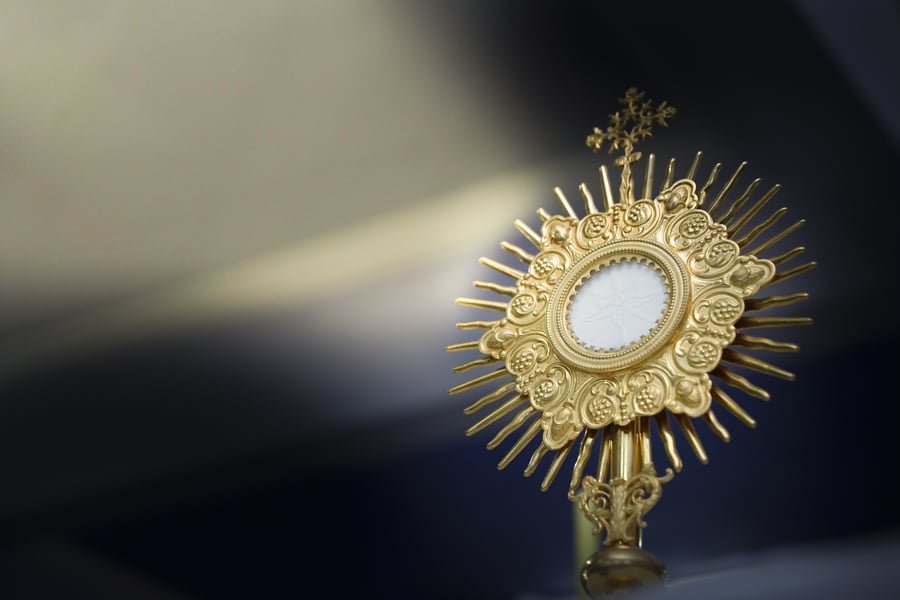Pope Francis announces Plenary Indulgence for participation in National Prayer Vigil, Mass for Life

The Fort Worth Diocese Holy Hour for life begins January 28 at 10:30 p.m. and will be livestreamed on the diocesan website.
FORT WORTH — For the first time since its inception in 1974, the national March for Life and its related events, including the Prayer Vigil for Life and Mass for Life, will be held virtually this year. Pope Francis has issued a decree that faithful Catholics who participate virtually in the National Prayer Vigil for Life on January 28 or the National Mass for Life on January 29 will receive a plenary indulgence.
The Diocese of Fort Worth, at the direction of Bishop Michael Olson, will participate in the National Prayer Vigil for Life. On Thursday, January 28, at 10:30 p.m., Father Pedro Martinez will preside over a Holy Hour for the intention of greater respect for the gift of life and an end to abortion. The faithful may attend the Holy Hour in person at St. Patrick Cathedral, adhering to the safety protocols of wearing masks and social distancing, or watch the livestream at fwdioc.org. The diocesan Holy Hour will be interpreted for the deaf.
The Holy Hour includes Exposition of the Blessed Sacrament, a benediction, and Eucharistic Adoration.
This year, the National Prayer Vigil for Life will open with an evening Rosary and opening Mass televised by EWTN from 7 p.m. to 10 p.m. (Central Time). The vigil will then continue with multiple livestreamed holy hours led by bishops from across the country from 10 p.m. to 7 a.m.
Mass for Life
The National Mass for Life is scheduled for 7 a.m. (Central Time) on Friday, January 29 at the Cathedral of St. Matthew in Washington, D.C. The Archbishop of Washington, D.C., Cardinal Wilton Gregory, will celebrate the Mass, and a livestream can be viewed at ewtn.com/prolife.
Pope Francis has granted a plenary indulgence for all faithful Catholics who participate in person or virtually in the National Vigil for Life and the National Mass for Life.
What is a Plenary Indulgence?
Even though sacramental confession absolves us of the guilt of sin, and therefore of the eternal punishment due to grave sin, temporal punishment remains even after the forgiveness of sins because we remain attached to our vices. In other words, the spiritual scars we have inflicted upon ourselves by sin remain, though the wounds have been bound up by forgiveness.
Works of devotion, penance, and charity in this life, and the purification of purgatory in the next, release us from the temporal punishment due to sin — as do indulgences.
A plenary indulgence, according to the Catechism of the Catholic Church (CCC 1471), “is a remission before God of the temporal punishment due to sins whose guilt has already been forgiven, which the faithful Christian who is duly disposed gains under certain prescribed conditions through the actions of the Church, which, as the minister of redemption, dispenses and applies with authority the treasury of the satisfactions of Christ and the saints.”
Indulgences are “...obtained through the Church who, by virtue of the power of binding and loosing granted her by Christ Jesus, intervenes in favor of individual Christians and opens for them the treasury of the merits of Christ and the saints to obtain from the Father of mercies the remission of the temporal punishments due for their sins” (Catechism of the Catholic Church 1478).
In other words, an indulgence is a special gift whereby the Church applies and dispenses the merits of Christ to the faithful to cancel out the painful punishments due to sin (i.e., temporal punishment). A plenary indulgence fully removes all temporal punishment due to sin, whereas a partial indulgence does so only partially.
The faithful can claim the indulgence for themselves or offer it on behalf of someone who has died.
The usual conditions for obtaining a plenary indulgence indicate that the faithful Christian must:
- have the interior disposition of complete detachment from sin, even venial sin;
- have sacramentally confessed his or her sins within 20 days of receiving the indulgence;
- receive the Holy Eucharist, preferably on the day receiving the indulgence;
- pray for the intentions of the pope.
